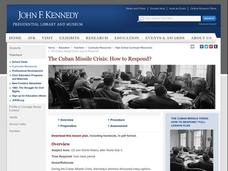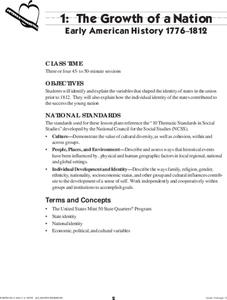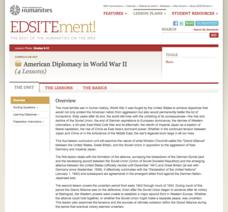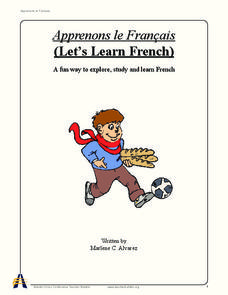Historical Thinking Matters
Scopes Trial: 1 Day Lesson
Why did many Tennesseeans support the 1925 Butler Act, which forbade the teaching of evolution? Using several primary source documents and a brief video clip, your young historians will draw connections between the broader historical...
Federal Reserve Bank
To Rent-to-Own or Not to Rent-to-Own?
Explore the key elements of a contract with your young adults, and delve into the features and unique benefits of a rent-to-own contract through discussion and worksheet practice.
John F. Kennedy Presidential Library & Museum
The Cuban Missile Crisis: How to Respond?
For 13 days, the United States stood on the edge of nuclear War. The Soviet Arms buildup in Cuba is the focus of an activity that asks groups to analyze how the governmental role each of John F. Kennedy's advisors played went on to...
John F. Kennedy Presidential Library & Museum
Analyzing the Inaugural Address
Get high school historians to step outside their own shoes by responding to JFK's inaugural address from the perspective of a civil rights activist, a soviet diplomat, or a Cuban exile. After a class discussion about the address, the...
US Mint
The Growth of a Nation
Young historians explore the identity of the early United States in this four-part instructional activity series. Working in groups of three, students research the political, economic, and cultural atmosphere of each member of the...
EngageNY
Properties of Area
What properties does area possess? Solidify the area properties that pupils learned in previous years. Groups investigate the five properties using four problems, which then provide the basis for a class discussion.
Mascil Project
Circular Pave-Stones Backyard
Pack the lesson into your plans. Young mathematicians learn about packing and optimization with the context of circular paving stones. They use coins to model the paving stones, and then apply knowledge of circles and polygons to...
Curated OER
Active Viewing: Abraham and Mary Lincoln: A House Divided
Young historians consider the cause and effects of the Emancipation Proclamation. They use handouts, response sheets, and class discussion to build an opinion about the subject after viewing the PBS documentary Abraham and Mary Lincoln:...
National Endowment for the Humanities
American Diplocmacy in World War II
The end of World War II saw the world deeply changed over the last few years. Four thorough lessons explore post-war Europe, America, and Asia through reading assignments and discussion questions about the Grand Alliance and the signing...
National Endowment for the Humanities
The House Un-American Activities Committee
Was the House Un-American Activities Committee justified in investigating subversive influences in the entertainment industry? Part two of the three-part series of lessons that examine the anti-communism movement after World War II,...
Humanities Texas
A President's Vision: George Washington
Who knew that one poster about George Washington could have so many learning possibilities attached to it? Here you'll find an attractive learning display on the first president of the United States, as well as worksheets and...
Federal Reserve Bank
Turn Your Radio On
After listening to and analyzing a series of FDR's Fireside Chats, groups create their own recordings, and using New Deal programs, address a current economic condition.
Curated OER
Teacher Notes
Gathering information, distinguishing between arguments, preparing an oral presentation; these skills are fostered as 10th graders explore aspects of global trade and politics. They use the Internet to gather information about NATO, The...
Atlantic Union Conference
Apprenons le Francais (Let's Learn French)
Bonjour! Teach your class this basic greetings and much more with a unit of materials. Included here are lessons, vocabulary practice materials and activities, conversation practice handouts, word puzzles, and more to support your class...
Civil War Trust
Genealogy
The Civil War is undoubtedly a part of America's history, but could it be part of your pupils' history as well? Middle schoolers conduct research to discover a connection between their ancestors and the American Civil War. Whether they...
Virginia Department of Education
Inductive and Deductive Reasoning
Introduce pupils to the two types of reasoning, inductive and deductive. Classmates work in pairs or small groups to learn the difference between the two and apply these reasonings to develop valid conclusions.
Channel Islands Film
Lone Woman of San Nicolas Island: Lesson Plan 4
Imagine being stranded all alone on an island for 18 years. How would you survive? Class members are challenged to makes necessities out of natural materials that would likely be found on an island.
Channel Islands Film
Arlington Springs Man: Lesson Plan 3
Imagine being part of a team of scientists that discover the oldest human remains in North America. Imagine being part of the crew that documents this discovery. Class members get a change to be part of such an exciting adventure in a...
National Endowment for the Humanities
Soviet Espionage in America
The war against Communism and Joseph McCarthy’s place in it are the focus of a series of three lessons examining postwar America from 1945-1950. This first lesson asks groups to read an introduction that describes the Verona Project and...
Curated OER
Persuasive Writing I
Examine the characteristics of an effective persuasive paper. In a group, eighth graders discuss the analogy of a debate being like a persuasive paper. After brainstorming topics, they write an argument and then debate it. Secretly, the...
National Endowment for the Humanities
Revolution '67, Lesson 1: Protest: Why and How
To some people, protesting is as American as apple pie, but the factors that lead to protests can be as confusing to veteran activists as to today's youth. Revolution '67 explores the riots in Newark, New Jersey as a case study. Using...
National Endowment for the Humanities
Revolution '67, Lesson 2: What Happened in July 1967? How Do We Know?
Even in a world in which dozens of participants and curious onlookers record every controversial event, the basic facts of what happened are often in dispute. Revolution '67, Lesson 2 explores 1967 Newark, New Jersey using an examination...
Federal Reserve Bank
What Really Caused the Great Depression?
Falling wages. Rising unemployment. Falling prices. Sound familiar? Young economists look at the role the US banking system had in causing the Great Depression.
Federal Reserve Bank
What Do People Say?
After reading a series of fictitious letters that represent actual events during the time period, young historians craft a small town newsletter to explain the causes of the Great Depression.
Other popular searches
- Sets Union Subset Intersect
- Union of Sets Math
- Set Theory Union Subset
- Sets Intersection and Union
- Set Element Union Subset
- Union Set Math

























